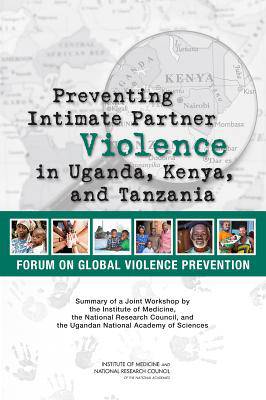
- Retrait gratuit dans votre magasin Club
- 7.000.000 titres dans notre catalogue
- Payer en toute sécurité
- Toujours un magasin près de chez vous
- Retrait gratuit dans votre magasin Club
- 7.000.0000 titres dans notre catalogue
- Payer en toute sécurité
- Toujours un magasin près de chez vous
Preventing Intimate Partner Violence in Uganda, Kenya, and Tanzania
Summary of a Joint Workshop by the Institute of Medicine, the National Research Council, and the Uganda National Academy of Sciences
National Research Council, Institute of Medicine, Board on Global Health, Forum on Global Violence PreventionDescription
Globally, between 15-71 percent of women will experience physical and/or sexual abuse from an intimate partner at some point in their lifetime. Too often this preventable form of violence is repetitive in nature, occurring at multiple points across the lifespan. The prevalence of intimate partner violence is on the higher end of this spectrum in East Africa, with in-country demographic and health surveys indicating that approximately half of all women between the ages of 15-49 in Uganda, Kenya, and Tanzania having experienced physical or sexual abuse within a partnership.
It is now widely accepted that preventing intimate partner violence is possible and can be achieved through a greater understanding of the problem; its risk and protective factors; and effective evidence-informed primary, secondary, and tertiary prevention. To that end, on August 11-12, 2014, the Institute of Medicine's Forum on Global Violence Prevention, in a collaborative partnership with the Uganda National Academy of Sciences, convened a workshop focused on informing and creating synergies within a diverse community of researchers, health workers, and decision makers committed to promoting intimate partner violence-prevention efforts that are innovative, evidence-based, and crosscutting. This workshop brought together a variety of stakeholders and community workers from Uganda, Kenya, and Tanzania to engage in a meaningful, multidirectional dialogue regarding intimate partner violence in the region. Preventing Intimate Partner Violence in Uganda, Kenya, and Tanzania summarizes the presentations and discussion of the workshop.
Spécifications
Parties prenantes
- Auteur(s) :
- Editeur:
Contenu
- Nombre de pages :
- 108
- Langue:
- Anglais
Caractéristiques
- EAN:
- 9780309374514
- Date de parution :
- 24-08-15
- Format:
- Livre broché
- Format numérique:
- Trade paperback (VS)
- Dimensions :
- 152 mm x 226 mm
- Poids :
- 181 g

Les avis
Nous publions uniquement les avis qui respectent les conditions requises. Consultez nos conditions pour les avis.






